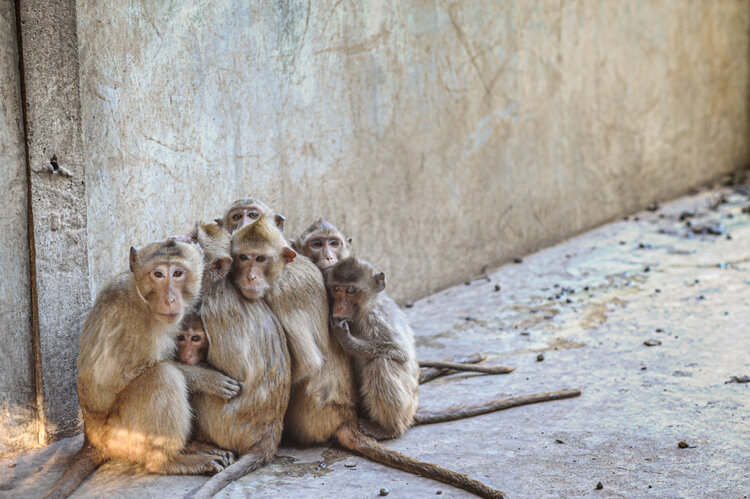America Is Running Out of Monkeys To Experiment On
Despite 35,000 monkeys being imported to the US each year for use in cruel experiments, numbers are running low after a host of problems. Now, experimenters have a chance to accelerate the move away from outdated animal tests.
Macaques huddled together at a macaque breeding facility, Laos, 2011. Credit: Jo-Anne McArthur / We Animals
Experimenters in America are facing a shortage of monkeys as a host of problems including supply bottlenecks, a marked increase in the number of animal tests, and import troubles, are being blamed for the ‘disappearance’ of macaque monkeys.
As a result, this struggle to source macaques for animal tests is leading more and more medical tests - including potential COVID-19 vaccines - to go straight to human-trials instead of relying on outdated animal testing.
“Nationally, there is basically a big shortage,” an infectious-disease scientist at the California National Primate Research Center, told The Atlantic.
America imported around 35,000 monkeys last year alone, with 60 percent of those bought from large scale monkey-breeding facilities in China. The US also has seven of its own ‘national primate centres’, all of which are funded by the National Institutes of Health (NIH), which help supply experimenters with monkeys.
Despite this staggering amount of monkeys, the COVID-19 pandemic has exacerbated the logistical problems of using monkeys in experiments. The rush for new COVID-19 vaccines has not only seen an increase in tests and a rise in demand for macaques, but China, one of the main exporters of macaques, has shut off exports of monkeys since the pandemic began.
“We can’t find any rhesus [macaques] any longer. They’ve completely disappeared,” the CEO of Bioqual, an animal testing organization told The Atlantic.
Aside from the unethical animal cruelty involved, this shortage is highlighting yet another dangerous pitfall of relying on animal testing. Macaques are not only time-consuming and expensive to handle, but are difficult to breed too.
As a result, this bottleneck caused because of NIH’s current reliance on animal testing, means that crucial academic and industry research cannot go ahead. “I have to tell them, ‘I’m sorry, we are not allowed to start your research,’” a representative from one of the seven NIH-funded primate centres reveals to The Atlantic.
In contrast, animal free-research that uses cutting-edge technology doesn’t need to rely on animals to run efficient tests. Progressive scientists now use a variety of new methods, including “advanced microchips that use real human cells and tissues to construct fully functioning postage stamp-size organs”. The current monkey shortage then could help accelerate a move away from animal tests towards more reliable and less expensive animal-free science.
Already, scientists are realising that the usual final stage of ‘monkey testing’ can be skipped altogether: Linda Marbán, CEO of biotech company Capricor Therapeutics, explained to The Atlantic that “her company tried to test its vaccine candidates at the California primate center. It couldn’t get in. She’s now exploring how to go straight into human-safety trials.”
Crucially, whilst primates share many similarities with humans, they often don’t portray any meaningful results when used in animal tests: two of the most widely used species in experiments are the rhesus macaques and cynomolgus macaques, both of which only get mildly sick from COVID-19.
Find out more on how campaigners are working to change the system and stop animal tests: listen to our podcast episode “Tax Payer Funded Torture” with Justin Goodman of The White Coat Waste Project here.
More stories:
Species Unite
A collection of stories of those who fight the good fight on behalf of animals.




Evaluating drugs with cutting-edge technology instead of animal testing will improve drug safety and cut development times, the agency said as it reveals a roadmap to increase non-animal research techniques.